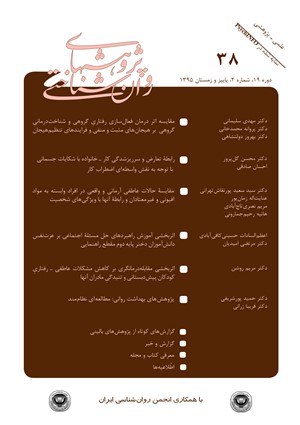اثربخشی آموزش راهبردهای حل مسئلة اجتماعی بر عزتنفس دانشآموزان دختر پایه دوم مقطع راهنمایی
محورهای موضوعی :اعظم السادات حسینیکافی آبادی 1
1 - اداره کل آموزش و پرورش استان یزد
کلید واژه: آموزش راهبردهای حل مسئلة اجتماعی عزتنفس دانش آموزان ,
چکیده مقاله :
این پژوهش، با هدف بررسی اثربخشی آموزش راهبردهای حل مسئلة اجتماعی بر عزت نفس دانشآموزان شهر یزد انجام شد. روش پژوهش، نیمه آزمایشی با طرح پیش آزمون ـ پس آزمون و با گروه آزمایش، گروه کنترل (بدون مداخله)، و پلاسیبوی روانشناختی (مداخله ای جز راهبردهای حل مسئله اجتماعی) بود. جامعه آماری این پژوهش را کلیه دانش آموزان دختر پایه دوم مقطع راهنمایی شهر یزد تشکیل می دادند که در سال تحصیلی 1392-1391 مشغول به تحصیل بودند. نمونه پژوهش 67 نفر بود (20 نفر آزمایش، 27 نفر پلاسیبوی روانشناختی، و 20 نفر کنترل) که با استفاده از روش نمونه گیری تصادفیِ خوشه ایِ چندمرحلهای انتخاب شدند. در متغیر عزتنفس از هر سه گروه پیشآزمون به عمل آمد. سپس، گروه آزمایش در ده جلسة 60 دقیقه ای تحت آموزش راهبردهای حل مسئلة اجتماعی قرار گرفتند. پس از اِعمال مداخلة آزمایشی، از هر سه گروه پس آزمون به عمل آمد. جهت سنجش عزتنفس از پـرسشنامه عـزتنفس کوپـر ـ اسمیت استفـاده شـد. نتـایج تحلیل کوواریانس یکراهه و آزمون تعقیبی بن فرونی نشان دادند پس از مداخله، در مقایسه با گروه کنترل و پلاسیبو، میانگین تعدیلشدة نمرههای عزتنفس در سطح P<0/001 و خرده مقیاس های آن، عزتنفس کلی و عزتنفس تحصیلیِ دانشآموزانِ گروه آزمایش افزایش یافته است، اما پس از مداخله، میانگین تعدیلشدة نمرههای عزتنفسِ اجتماعی و عزتنفسِ خانوادگی دانشآموزان گروه آزمایش افزایش نیافته است. نتیجه آنکه، با توجه به یافته های پژوهش میتوان گفت آموزش راهبردهای حل مسئله اجتماعی موجب افزایش عزتنفس شده است. بنابراین، از این روش می توان به منزله یکی از روشهای احتمالی افزایش عزتنفس در دوران حساس بلوغ استفاده کرد.
This study aimed to investigate the effectiveness of training social problem solving strategies on self-esteem in second-grade guidance schools female students in Yazd. The research design was quasi-experimental with pre-test, post-test, and control group. (Without intervention) and pcychological placebo group (except for intervention of social problem solving strategies). The population in this study comprised of second-grade guidance school female students in Yazd who were enrolled in school year 2012-2013. The sample of this study consisted of 67 students who were selected using multistage random cluster sampling and were assigned in three groups (experimental: N=20, control: N=20, and psychological placebo: N=27). As for self- esteem a pre-test was performed in all the experimental, control and placebo groups. Social problem solving strategies training was performed on experimental group in 10 sessions 60 minutes each. Following the experimental intervention, self-esteem of the three groups were measured again. Cooper Smith Self-esteem Inventory was used for measuring self-esteem. Analysis of covariance and Bonferroni Post hoc test were used to check the results. The results showed that in the experimental group social problem solving strategies training increased adjusted mean scores of self-esteem scores (P<0.001) and mean scores on the subscales of self-esteem, including total self-esteem and educational self-esteem, were increased. But this intervention could not increase adjusted mean scores of family self-esteem and social self-esteem. According to the research findings, social problem solving strategies training increased self-esteem. So this method can be used as one of the possible ways to increase self-esteem in the critical period of puberty.


